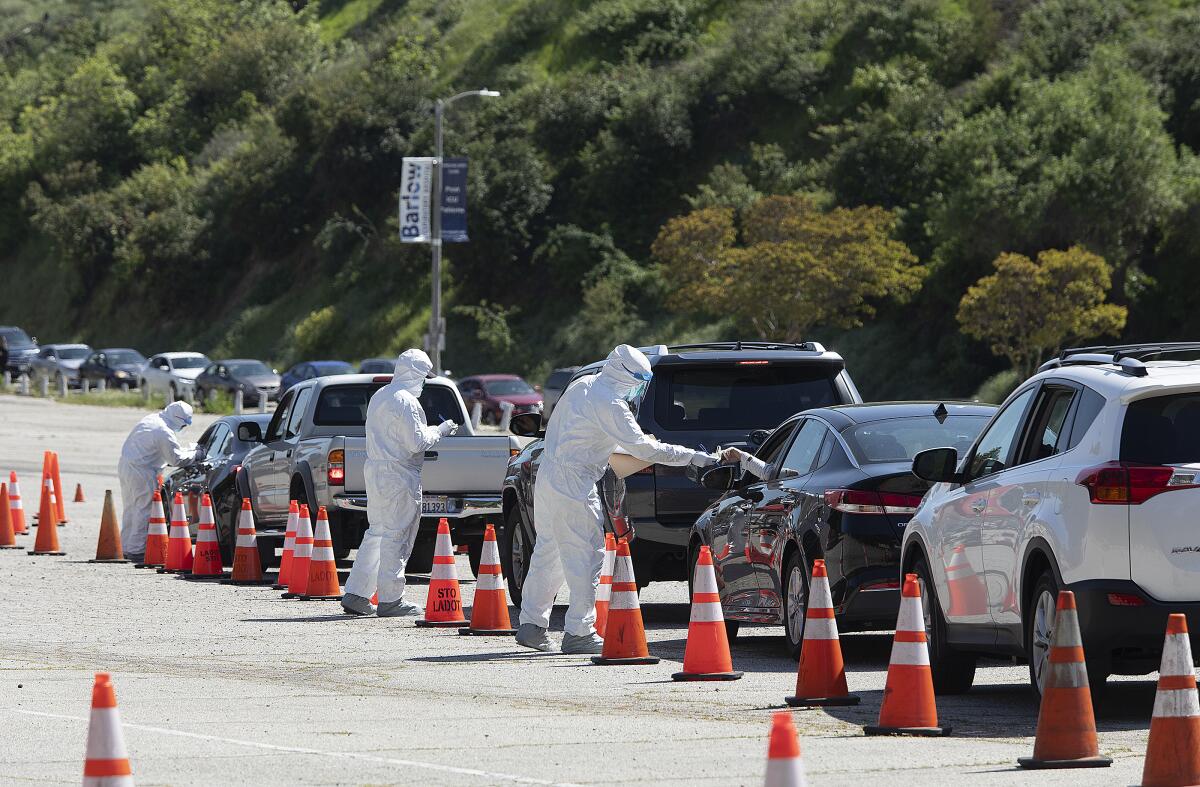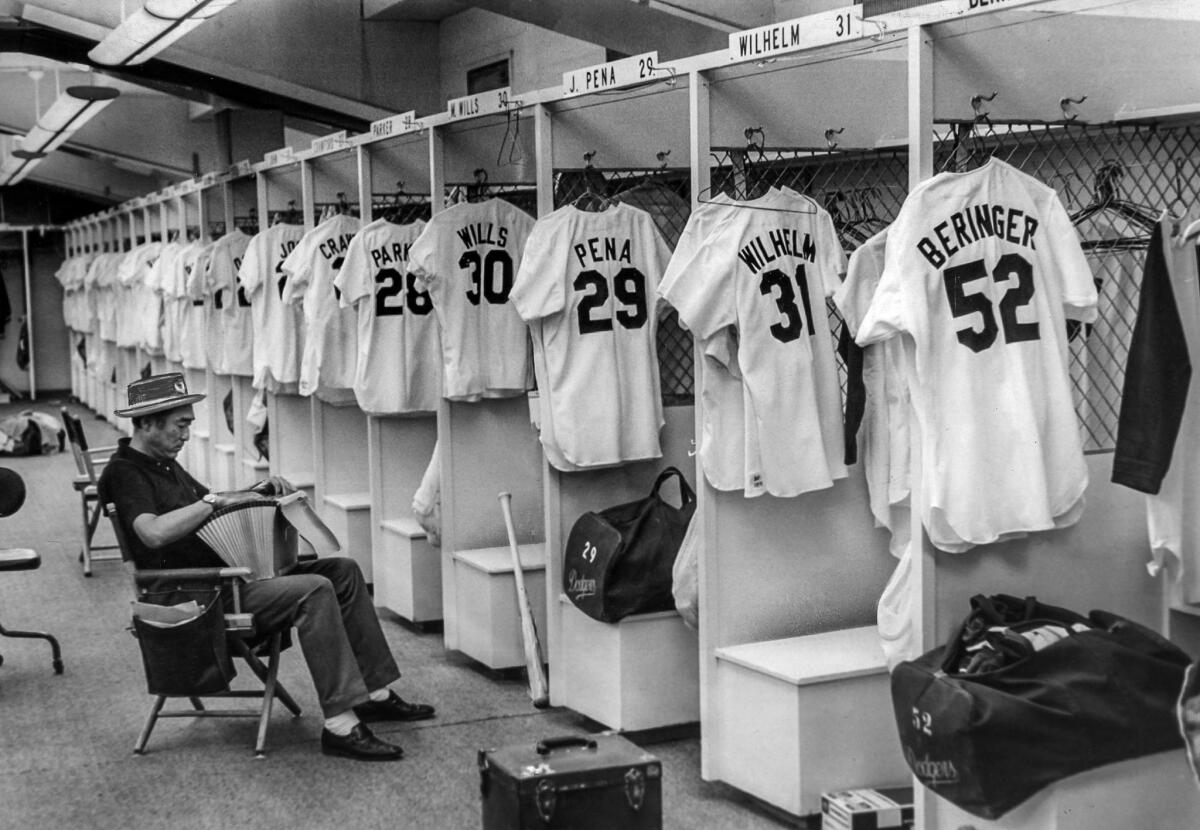Newsletter: Hospitals’ urgent search for supplies

- Share via
Hospitals across the U.S. are engaged in a chaotic competition for safety gear and more.
TOP STORIES
Hospitals’ Urgent Search for Supplies
Masks. Face shields. Ventilators. All of these and more pieces of equipment are in short supply in California and across the U.S. as hospitals try to gear up for a growing wave of patients sickened by the new coronavirus.
Nurses and doctors are pleading for donations online, telling stories of reusing masks and rigging trash bags as gowns. Some have raised money to buy safety gear but can’t find any sellers with supply. In short, fierce competition and a lack of central coordination are fueling hospitals’ desperate search for protective gear.
Echoing a call across much of the country, California Gov. Gavin Newsom said the worst is yet to come, both in illness and need. He said he expects the state to require 66,000 hospital beds by the end of May, with 40% of those projected to be patients who may require ventilators — of which the state currently has 4,252.
On Wednesday, coronavirus cases in the state barreled toward 10,000, with the death toll topping 200. One San Francisco Bay Area health officer said California faces 5,000 coronavirus deaths a week if the state’s stay-at-home policies are relaxed too early.
With the federal government slow to act on obtaining those vital goods and largely pushing the responsibility onto governors, California has been purchasing its own. But some on the front lines say it’s not enough to stem the chaos and shortages. The state, they say, needs to step up efforts to buy and distribute key items and ensure they go to those with the greatest need, not just to those with luck and money.
And across the U.S., with little coordination by the Trump administration, the well-connected are often getting to the front of the line.
A Treatment or Wishful Thinking?
Infectious disease experts consider chloroquine and hydroxychloroquine to be promising as possible treatments for COVID-19, but there’s a lot more they’d like to know before certifying the drugs, which can have dangerous side effects, for clinical use.
That hasn’t stopped President Trump and others from touting them, which has led to shortages for those who take the medicine for approved uses. So where did they get their information? Columnist Michael Hiltzik looks at the science behind the claims and the politically well-connected French researcher tied to them.
You Can’t Harvest Over Zoom
More than a third of the country’s vegetables and two-thirds of its fruits and nuts are grown in California. Shelter-in-place orders in California exempt the estimated 420,000 farmworkers as essential employees. But many are undocumented, lack health insurance and don’t qualify for unemployment insurance or federal COVID-19 relief.
For workers on the Central Coast, this could be the worst possible time to face a health crisis. With peak strawberry season next month, pay switches from hourly to piece rate, and pickers are incentivized to work hard and fast. And as one farmworker advocate says, “You can’t pick strawberries over Zoom.”
More Top Coronavirus Headlines
— California officials say public K-12 school campuses are expected to remain closed for the remainder of the academic year as educators take on the massive challenge of distance learning for about 6.1 million students.
— The University of California will greatly ease some admission requirements by eliminating SAT test scores and letter grades for required courses, saying that “grave disruption” to schools calls for maximum flexibility in evaluating students.
— L.A. Mayor Eric Garcetti joined a growing push for residents to wear face coverings when out in public. He also has threatened to shut off utilities to nonessential businesses that defy the Safer at Home restrictions and announced new guidelines that will require all construction sites in the city to create a “COVID-19 exposure control plan.”
— As projections of the coronavirus death toll soar, forecasts for the ensuing economic carnage have also quickly turned much darker — both for the depth and duration of the damage.
— More babies are born in Los Angeles County than anywhere else in the United States. But with COVID-19 cases surging, women are preparing for a world where the city’s hospitals might bar visitors from maternity wards. Those who recently had their babies have entered the bizarre reality of being new parents in the age of coronavirus.
Plus, here are some tips on getting through the days ahead. For more, sign up for Coronavirus Today, a special edition of The Times’ Health and Science newsletter that will help you understand more about COVID-19. As with all our newsletters, it’s free:
— Should you wear a mask at the grocery store? Coronavirus advice keeps changing.
— FAQ: Your top questions answered.
— How to care for someone with COVID-19.
— Can pets become infected with the new coronavirus?
Start your day right
Sign up for Essential California for the L.A. Times biggest news, features and recommendations in your inbox six days a week.
You may occasionally receive promotional content from the Los Angeles Times.
FROM THE ARCHIVES
On April 2, 1972, the Dodgers were nearly ready to start a new season. The only thing missing? The people. The day before, players had begun a strike over their compensation. For nearly two weeks, locker rooms and stadiums sat empty. It was the first players strike in Major League Baseball, and 86 games were skipped. They weren’t rescheduled, but players did return to their clubhouses by April 13.

CALIFORNIA
— A former admissions official at USC will plead guilty to helping graduate students from China gain acceptance to the school by submitting doctored transcripts and fraudulent recommendation letters.
— As L.A. city leaders face urgent pleas for help amid a global pandemic, they are also confronting distrust and revulsion over alleged bribes and other “pay to play” activities. Several current and former council members were named in a federal probe.
— California’s coronavirus stay-at-home orders have reduced vehicle collisions on roadways by roughly half, according to a UC Davis survey.
— After six years, the Dodgers’ TV channel will be widely available in L.A. What happened to end the virtual blackout?
— After a dry winter, the weather outlook calls for a wet start to April in all of California.
Enjoying this newsletter?
Subscribe to the Los Angeles Times.
NATION-WORLD
— Nearly 300 employees of the Homeland Security Department have tested positive for COVID-19, and more than 8,500 are under quarantine, sidelining them as the agency struggles to respond to the pandemic.
— The World Health Organization is finding its authority tested by the pandemic. Health experts say powerful national interests are overshadowing shared ones.
— As the coronavirus spreads in Ecuador, bodies are being left on the streets.
— Should the census count prisoners as residents of the community where they’re incarcerated or of their home when they were arrested? It’s a complicated question with far-reaching implications.
— At the daily coronavirus news briefings, Trump has shown favor to OAN, a lesser-known right-wing media outlet.
HOLLYWOOD AND THE ARTS
— Adam Schlesinger, whose band Fountains of Wayne made him a cult favorite of pop connoisseurs and who wrote songs for film and television, has died from complications related to COVID-19. He was 52.
— A Netflix series predicted a global pandemic. It was dismissed as “a show about the flu.”
— L.A.’s Museum of Contemporary Art has furloughed or cut pay for most of its staff.
— Quibi was already a gamble. Will the coronavirus crisis help or hurt the streaming service? Meanwhile, a rival wants a court to halt its launch.
BUSINESS
— More of L.A.’s restaurants are closing their doors after sales decline and coronavirus fears rise. The list now includes Sqirl, Mozzaplex and Taco Maria.
— Hulu founder Jason Kilar has been named WarnerMedia CEO ahead of the company’s anticipated HBO Max launch.
SPORTS
— Wimbledon‘s cancellation hurts more than most disrupted sports events, columnist Helene Elliott writes.
— The NCAA Division I Council approved an extra year of eligibility for spring sport college athletes. Schools aren’t sure they can afford it.
— The Dodgers and Angels — and every other major league team — each committed $1 million to provide financial assistance to game-day workers. But plenty of those workers say they haven’t seen a dime, and the bills are piling up.
OPINION
— Trump’s not the first president to face a deadly epidemic. But he may be the least suited for the task, two professors contend.
— Farmers markets can be a great resources. But they can’t stay open if customers keep treating them like spring break, writes The Times’ Carla Hall.
WHAT OUR EDITORS ARE READING
— Grocery stores need employees. Restaurant workers need jobs. The math isn’t as simple as it sounds. (Eater)
— A couple drove all the way from Quebec to Yukon to escape the coronavirus, and the locals weren’t too pleased. (Vice)
ONLY IN L.A.
When Beverly Hills police pulled over a stolen sport utility vehicle this week, a bit of a mystery unspooled. They found 192 rolls of a hot commodity — toilet paper — inside. Police arrested the driver but said it was unclear whether the toilet paper was stolen or where it came from.
Said Beverly Hills Police Lt. Elizabeth Albanese: “The driver was arrested for several charges — unrelated to the toilet paper.”
Comments or ideas? Email us at [email protected].
Sign up for Essential California
The most important California stories and recommendations in your inbox every morning.
You may occasionally receive promotional content from the Los Angeles Times.



